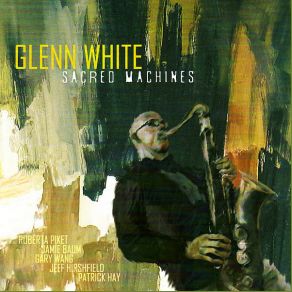Sacred Machines
Download links and information about Sacred Machines by Glenn White. This album was released in 2008 and it belongs to Jazz genres. It contains 7 tracks with total duration of 41:12 minutes.

|
|
|---|---|
| Artist: | Glenn White |
| Release date: | 2008 |
| Genre: | Jazz |
| Tracks: | 7 |
| Duration: | 41:12 |
| Buy it NOW at: | |
| Buy on iTunes $6.93 | |
Tracks
[Edit]| No. | Title | Length |
|---|---|---|
| 1. | Sacred Machines | 4:31 |
| 2. | Split Infinity | 5:23 |
| 3. | Triality | 6:25 |
| 4. | Washington Heights | 7:02 |
| 5. | Phobia | 5:32 |
| 6. | Wish | 7:32 |
| 7. | Aftermath | 4:47 |
Details
[Edit]For his sophomore effort (his first on a label), New York saxophonist Glenn White has brought together a wide range of influences and stylistic elements, combining it all into one surprisingly coherent work. The album opens with the title track, a dense piece that takes some cues from Coltrane's "Giant Steps" motifs, particularly in the piano comping, excellently provided by Roberta Piket. The album takes a good turn toward the urban with pieces like "Triality," also combining the flute of Jamie Baum to a degree not common in jazz albums. For White, the flute appears to act as a melodic lightener when used alone, as well as a harmonic addition, doubling the sax lines from time to time. In "Washington Heights," White combines the nightclub style of jazz common to New York with a spaciousness to the composition (largely due to some extra flute used to set the scene), a common element in a lot of jazz produced west of the Mississippi (White has spent time in both Arizona and Alaska). There's a little more counterpoint and what almost sounds like a quick rondo in "Phobia," some nice soloing all around in "Wish," and a driving rhythm section in "Aftermath" that opens up with the winds in a way that almost evokes Albert Ayler. Sacred Machines features a little bit of discord in the instruments, a little bit of complexity in the compositions, a little bit of richness in the sax solos, and a lot of highly intriguing music pumped out by the whole ensemble. With this release, White proves himself worthy of the jump from self-production to the eclectic but quality-driven OA2 label.